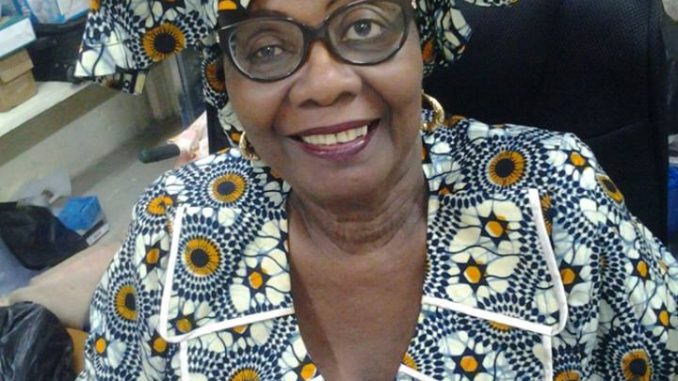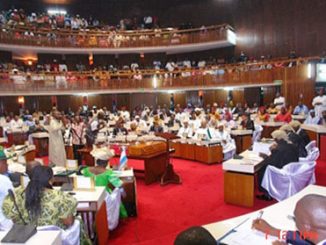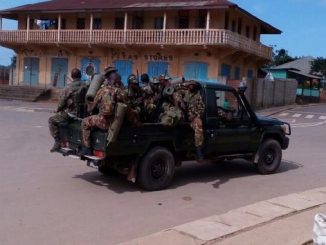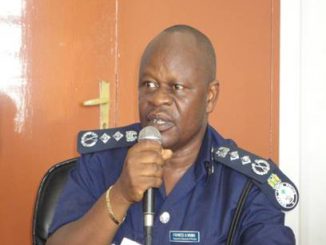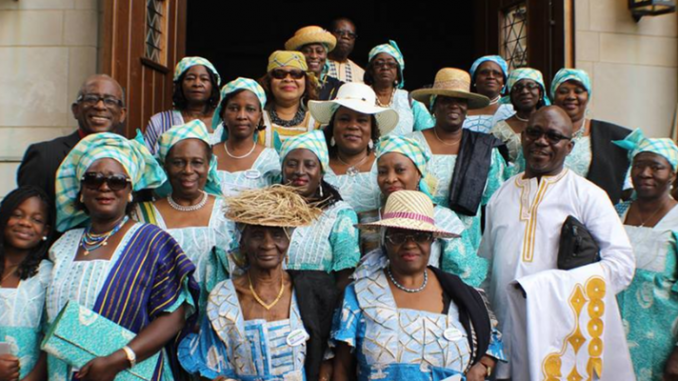
By Dennis Kabatto
After an emotional homecoming to Freetown, Sierra Leone in December 2016, the Krio Descendants Union Northeast Chapter will assemble in New Brunswick, New Jersey for its 9th Family Reunion.
Organizers announced Sunday, August 27th that tickets are no longer available for sale on the social media site Eventbrite but advised that they could accommodate last minute orders via email for the three day events that kicks off on Friday, September 1st – Sunday, September 3rd at the Hyatt Hilton Hotel in downtown New Brunswick.
Estina Adekunle Kabia, Social– Secretary, KDU Sierra Leone
The Reunion is expected to draw hundreds of members, friends, families and well wishers from across the United States, Britain and Sierra Leone.
“On this KDU Family Reunion on Labor Day we will showcase our heritage, promote our culture and dilate on our political and economic outlook. An unforgettable weekend awaits us,” said Mrs. Estina Adekunle Kabia, Social Secretary, KDU Sierra Leone Chapter, who came from the capital Freetown for the celebration.
Melbourne Garber, President of the Northeast Chapter and the Archivist and immediate past Chair of the KDU Global Organization revealed to African New Dawn Radio Show during a recent live in studio interview on WRSU, 88.7 FM at Rutgers University, New Brunswick campus that after a bit of deliberation they decided this year’s theme will be Krios in the Diaspora Past, Present and Future.
Photo – Left second row – Melbourne– Garber, President of the Northeast Chapter and the Archivist and immediate– past Chair of the KDU Global
The group has been rallying round to get Krios to come together to grow the organization and also to learn our history. Though the theme is Past, Present and Future they will be focusing more so on the present and the future because they feel it is important to pass on the history, culture and heritage to the young generation so as to make sure that they have an experience of the Krio culture that will keep them interested and keep them wanting to learn more about it, Garber said during the radio interview.
Read excerpt of the interview below
Who are the Krios?
In order to talk about the present we have to talk about the past. The Krios have always been involved in the development of Sierra Leone. They were the first doctors, lawyers etc. in Sierra Leone.
The Krios are really made up of 3 major groups. The first group was called the Nova Scotian Settlers. They were basically African Americans and enslaved Africans who had fought with the British during the American War of Independence. Obviously, the British had promised them their freedom if they fought on their side so when they lost they actually took them from America to Nova Scotia. And they found that conditions in Nova Scotia were really bad so they petitioned the British government who then agreed to take them to Sierra Leone. There had been a group that had gone before in 1787 but this group the Nova Scotian settlers almost 1200 of them were taken to Freetown and they started the Colony of Freetown.
There is this other group the Maroons from Jamaica who after the second Maroon war, the Maroons who surrendered to the British were then taken also to Nova Scotia which they didn’t expect. They also found out that the conditions were really bad and they also petitioned that they wanted to go to Sierra Leone because they have heard about the other group that had gone so about 550 of them were taken to Sierra Leone in 1800.
And the third and largest group of the people who became the Krios the ones we call the liberated Africans who after the British had abolished the slave trade the British navy patrolled the west coast of Africa trying to intercept slave ships that group amounted to 90,000 – 95,000 enslaved Africans so that whole group is what evolved to become the Krios of Sierra Leone.
How are Krios contributing to the development of Sierra Leone?
Krios have always contributed to the development of Sierra Leone. Of course now with the larger population of Sierra Leone contributing to overall development, the Krios are still contributing but it may not be as impactful as it was before. Contrary to what people might think or believe, we are still involved in the political activities of the country.
How are you keeping the younger generation of Krios engaged in the heritage and traditions of the Krios?
One of the primary aims of the Krio Descendants Union organization is the importance of passing its rich history and heritage to the younger generation. One of the things we have done in this year’s Family Reunion is to involve the younger generation in every facet of the planning of the event. We have empowered them to take an active role and they have stepped up to the challenge. We believe this type of engagement will be incorporated by all the other chapters.
How are Krios reaching out to the larger Sierra Leonean communities in the Diaspora?
We as Krios have recognized that not only have we got Krios working and living in many different places around the world, but we recognize our kinship and relationship to the Maroons of Trelawney in Jamaica and also the Gullah/Geechee people of South Carolina and Georgia. To enhance this relationship, we have invited both the Maroons and Gullah to participate in this year’s Family Reunion. In fact, last year I represented the KDU Family at the Treaty Day celebrations in Trelawney.
What is your reaction to people who say having Krio, Temne, Mende, Kono, Fullah and other groups heritage celebration is promulgating tribalism?
In my view, having these different Descendants Associations is not necessarily a bad thing as long as they do not use them to create divisions. As far as I am concerned and I am sure I speak for many within our group that I am a Sierra Leonean first and also a Krio. Preservation of your culture and heritage should not come at the expense of the national development of the country. While we recognize that tribalism is always a thorn in our national discourse, being Sierra Leonean should always take precedence and all these different organizations must work diligently to promote this.

